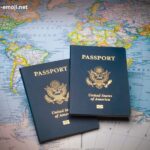In today’s interconnected world, travel is an essential aspect of both personal and professional life. However, certain circumstances can lead to individuals being issued a restricted travel card. This article will delve into the situations that typically result in this kind of limitation, the implications of having a restricted travel card, and what individuals can do if they find themselves in such a situation.
What is a Restricted Travel Card?
A restricted travel card is typically a form of financial instrument or identification that allows the holder to travel under specific limitations or conditions. This may be issued by governmental agencies, employers, or financial institutions, and it often comes with restrictions that can include limitations on travel destinations, types of expenditures, and duration of travel.
Situations Leading to Issuance of a Restricted Travel Card
1. Financial Misconduct or Fraud
One of the most common situations leading to a restricted travel card is financial misconduct or fraud. If an individual is found to have engaged in fraudulent activities—such as misusing company funds or falsifying travel expenses—they may face severe repercussions, including the issuance of a restricted travel card. This serves as a precautionary measure to prevent further misuse of funds and limit the individual’s ability to engage in similar activities.
2. Legal Issues
Individuals who are involved in ongoing legal issues, such as criminal investigations or court cases, may also be subject to travel restrictions. Courts can impose limitations on travel as a condition of bail or probation, especially in cases involving serious charges. A restricted travel card may be issued to ensure compliance with these legal restrictions, preventing the individual from leaving the jurisdiction without permission.
3. Employment Policies
Employers often have strict travel policies that can result in employees receiving restricted travel cards. For instance, if an employee has violated company travel policies—such as using a corporate travel card for personal expenses—they may face disciplinary action, which can include being issued a restricted travel card. This card might limit the employee to only approved destinations or specific types of expenditures related to work.
4. Security Concerns
In some cases, individuals may be issued restricted travel cards due to security concerns. This is especially relevant for government employees, contractors, or military personnel who may be privy to sensitive information. If an individual is deemed a security risk, they may be subjected to restrictions that limit their ability to travel freely, often requiring them to report their travel plans to a supervisor or security officer.
5. Health and Safety Issues
Health and safety considerations can also lead to the issuance of a restricted travel card. For example, during public health emergencies, such as the COVID-19 pandemic, authorities may implement travel restrictions for individuals who have been exposed to infectious diseases or who are not vaccinated. In these situations, a restricted travel card may serve as a mechanism to monitor and control travel behavior to mitigate the spread of illness.
6. Credit or Financial Stability Issues
Financial instability can lead to restricted travel cards, particularly when it comes to credit cards or loans associated with travel. If an individual is facing bankruptcy, has significant debt, or has defaulted on loans, creditors may impose restrictions on travel-related expenditures. This ensures that the individual does not incur further debt while also providing a measure of protection for the lender.
7. Immigration Status
For individuals on temporary visas or under certain immigration statuses, travel restrictions may apply. If an individual is awaiting a decision on their immigration status or has violated the terms of their visa, they may be issued a restricted travel card to prevent them from leaving the country without proper documentation. This can also be true for those involved in immigration hearings or proceedings.
8. Behavioral Concerns
Behavioral issues, including harassment or other disruptive conduct, can lead to the issuance of a restricted travel card. For instance, if an individual has been involved in incidents that pose a threat to others during travel—such as harassment, substance abuse, or violent behavior—organizations or authorities may issue a restricted travel card. This limitation serves to protect the individual and others from potential harm.
Implications of Having a Restricted Travel Card
1. Limited Travel Opportunities
Having a restricted travel card significantly limits an individual’s travel opportunities. The restrictions can range from prohibiting travel to certain destinations to limiting the duration and purpose of travel. This can have serious implications for both personal and professional life, including the inability to attend important events or conduct business operations.
2. Impact on Employment
For employees, a restricted travel card can affect their job performance and career advancement. Travel is often a critical component of many roles, especially in sectors like sales, consulting, or international relations. Being unable to travel freely can limit an employee’s effectiveness, which may lead to negative performance reviews or even job loss.
3. Financial Consequences
Individuals with restricted travel cards may also face financial consequences. Restrictions can limit their ability to make travel-related purchases, which can affect personal plans or business operations. Additionally, if the restrictions stem from financial misconduct, the individual may also face fines or restitution payments, further complicating their financial situation.
4. Social and Personal Impact
Socially, having a restricted travel card can lead to feelings of isolation or stigma. Individuals may miss out on family gatherings, vacations, or cultural experiences due to their travel limitations, impacting their mental and emotional well-being.
What to Do if You Receive a Restricted Travel Card
1. Understand the Terms
The first step for anyone receiving a restricted travel card is to thoroughly understand the terms and conditions associated with it. Knowing what is permitted and what is not will help the individual navigate their situation more effectively.
2. Communicate with Relevant Authorities
If the restricted travel card is issued by an employer, financial institution, or legal authority, it is crucial to maintain open lines of communication. Understanding the reasons behind the restrictions and discussing potential pathways to lift them can be beneficial.
3. Explore Legal Options
In situations where the issuance of a restricted travel card seems unjust or unclear, individuals may want to consult with legal professionals. Legal advice can provide clarity on rights and options for contesting the restrictions.
4. Focus on Compliance and Improvement
Adhering to the restrictions and demonstrating a commitment to improvement can be essential steps in regaining full travel privileges. For instance, if the restriction is due to financial issues, focusing on debt repayment and financial management can improve one’s standing.
5. Plan Travel Wisely
When travel is permitted, planning trips that align with the restrictions is essential. Being proactive and mindful of travel choices can help ensure compliance and reduce the likelihood of further restrictions.
Conclusion
Restricted travel cards are issued in various situations, often as a protective measure for individuals or organizations. Understanding the circumstances that lead to such restrictions is crucial for anyone who may find themselves in this situation. By recognizing the implications and taking proactive steps, individuals can navigate the complexities of restricted travel and work towards regaining their freedom to travel. Whether due to financial misconduct, legal issues, employment policies, or other factors, being informed and responsive is key to addressing the challenges posed by a restricted travel card.



